Lasswell Harold D. The Political Writings of Harold D. Lasswell
Подождите немного. Документ загружается.

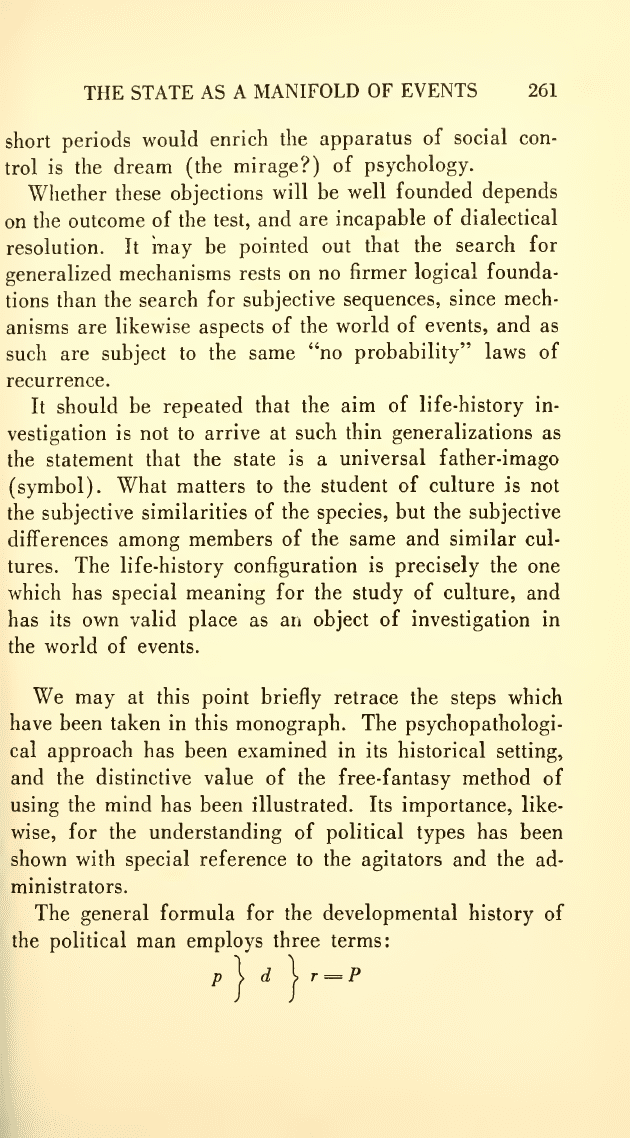
THE
STATE
AS A
MANIFOLD
OF EVENTS 261
short
periods
would
enrich
the
apparatus of
social
con-
trol
is
the
dream
(the
mirage?)
of
psychology.
Whether
these
objections
will be
well
founded
depends
on
the
outcome
of the
test, and
are
incapable
of dialectical
resolution.
It may be
pointed
out
that the
search for
generalized
mechanisms
rests
on no
firmer
logical founda-
tions than
the
search for
subjective
sequences,
since
mech-
anisms are
likewise
aspects of
the
world
of events, and
as
such are
subject to
the
same "no
probability" laws of
recurrence.
It
should
be repeated
that the
aim of
life-history in-
vestigation is not to
arrive
at
such
thin generalizations
as
the
statement that
the state
is
a
universal father-imago
(symbol).
What matters
to
the
student of culture is
not
the
subjective
similarities of
the species,
but
the subjective
differences
among members
of the
same and similar
cul-
tures.
The life-history
configuration is
precisely
the one
which has special
meaning for the study of culture,
and
has
its own valid place
as
an object
of
investigation in
the world of events.
We may
at
this
point briefly retrace the
steps
which
have been taken in this
monograph. The psychopathologi-
cal approach has
been
examined in
its
historical
setting,
and the
distinctive
value of the free-fantasy method
of
using the
mind
has been illustrated. Its importance,
like-
wise, for the understanding of political
types has been
shown with
special reference
to
the agitators
and the
ad-
ministrators.
The
general formula for the
developmental
history
of
the political
man
employs
three terms:
d
\ r
=
P
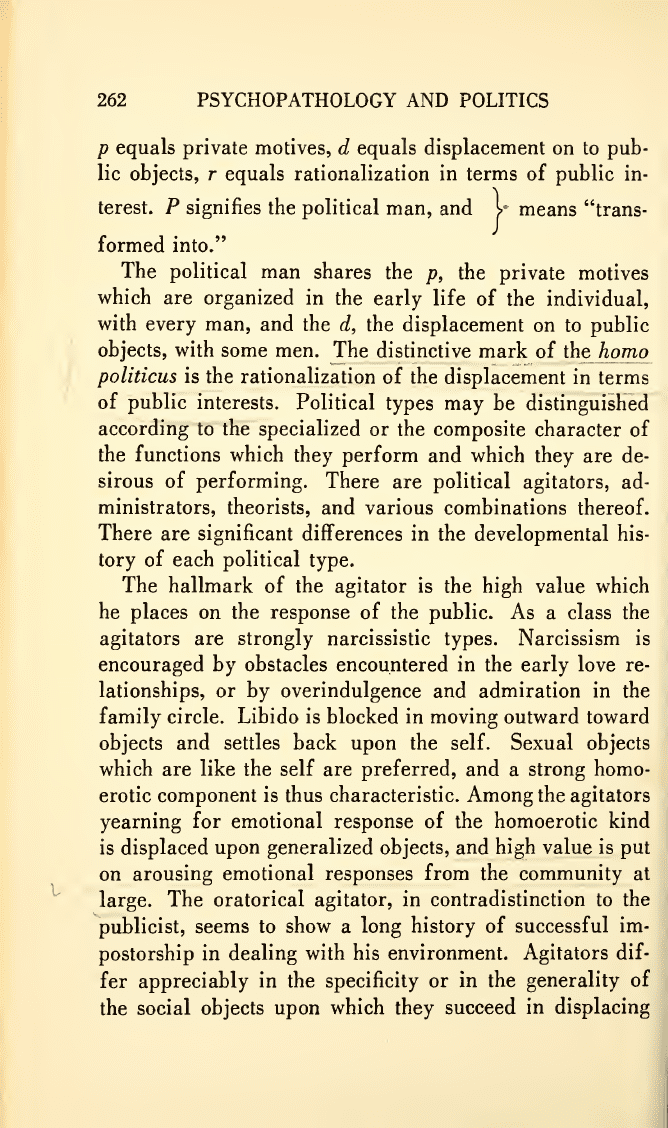
262
PSYCHOPATHOLOGY AND POLITICS
p
equals private motives,
d
equals displacement
on to pub-
lic
objects,
r
equals
rationalization
in terms of
public in-
terest. P signifies
the political
man,
and V
means
"trans-
formed into."
The
political
man
shares the
p,
the
private motives
which
are organized
in
the early life
of the
individual,
with every
man, and
the
d,
the
displacement
on
to
public
objects, with some
men.
The distinctive
mark
of the homo
politicus
is the
rationalization
of the displacement
in terms
of public
interests.
Political
types may be
distinguished
according
to the specialized
or the composite
character
of
the functions which
they
perform and which they
are
de-
sirous of performing.
There
are
political
agitators,
ad-
ministrators, theorists,
and various combinations
thereof.
There are significant differences
in the developmental
his-
tory of each
political
type.
The hallmark of
the agitator is the high value which
he places
on
the response
of the public. As
a
class the
agitators are strongly narcissistic
types.
Narcissism is
encouraged by obstacles encountered in the early love re-
lationships, or by overindulgence
and admiration in the
family circle. Libido is blocked in moving outward toward
objects and
settles
back upon the self. Sexual objects
which are like the self
are
preferred,
and
a
strong homo-
erotic
component
is
thus characteristic. Among
the
agitators
yearning
for emotional
response
of the homoerotic kind
is displaced
upon
generalized objects, and
high
value is
put
on
arousing
emotional responses from the community at
large.
The oratorical
agitator, in contradistinction
to
the
publicist,
seems to
show
a
long history of
successful im-
postorship in
dealing
with his environment. Agitators
dif-
fer
appreciably
in the specificity
or in the generality
of
the
social objects upon
which they
succeed in
displacing
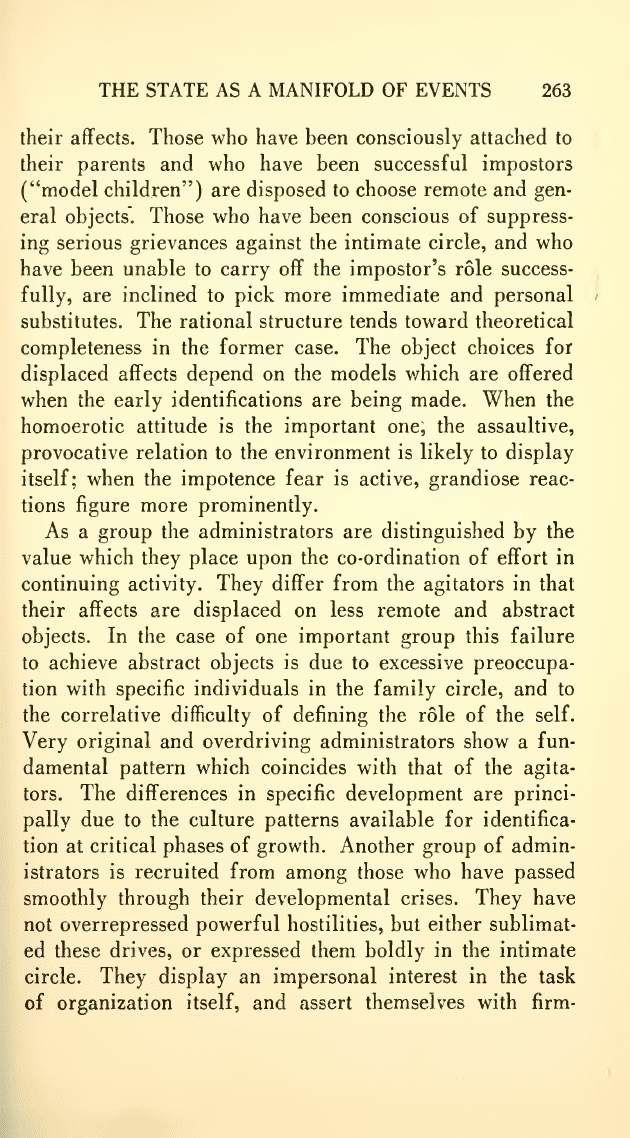
THE
STATE
AS A
MANIFOLD OF
EVENTS 263
their affects. Those who have
been
consciously attached to
their parents and who have
been
successful impostors
("model children") are disposed to choose
remote and gen-
eral objects. Those who have been
conscious of suppress-
ing serious grievances against the
intimate circle, and who
have been unable to
carry
off
the impostor's role success-
fully,
are
inclined
to
pick more immediate and personal
substitutes. The rational
structure
tends toward
theoretical
completeness in the
former
case.
The
object
choices for
displaced
affects depend
on
the models which are offered
when
the early identifications are being made. When the
homoerotic
attitude is the important one, the assaultive,
provocative
relation
to
the environment is likely
to
display
itself;
when the impotence fear is active, grandiose reac-
tions
figure more prominently.
As a
group the administrators are distinguished
by
the
value
which they place upon the co-ordination of effort in
continuing activity. They
differ from
the agitators
in
that
their affects are
displaced
on less remote and abstract
objects.
In the
case
of
one
important
group
this failure
to
achieve abstract objects is due
to excessive preoccupa-
tion with specific individuals in the family circle,
and
to
the correlative
difficulty
of defining the role of the self.
Very
original
and
overdriving
administrators show
a
fun-
damental pattern which coincides with
that of the agita-
tors. The differences in specific development are princi-
pally due to
the culture
patterns available for identifica-
tion
at
critical phases of growth.
Another
group of admin-
istrators is
recruited from
among those who have passed
smoothly
through their developmental crises. They have
not
overrepressed
powerful
hostilities, but
either sublimat-
ed these
drives, or expressed them boldly in the intimate
circle.
They display an impersonal
interest
in the task
of
organization
itself,
and assert
themselves
with
firm-
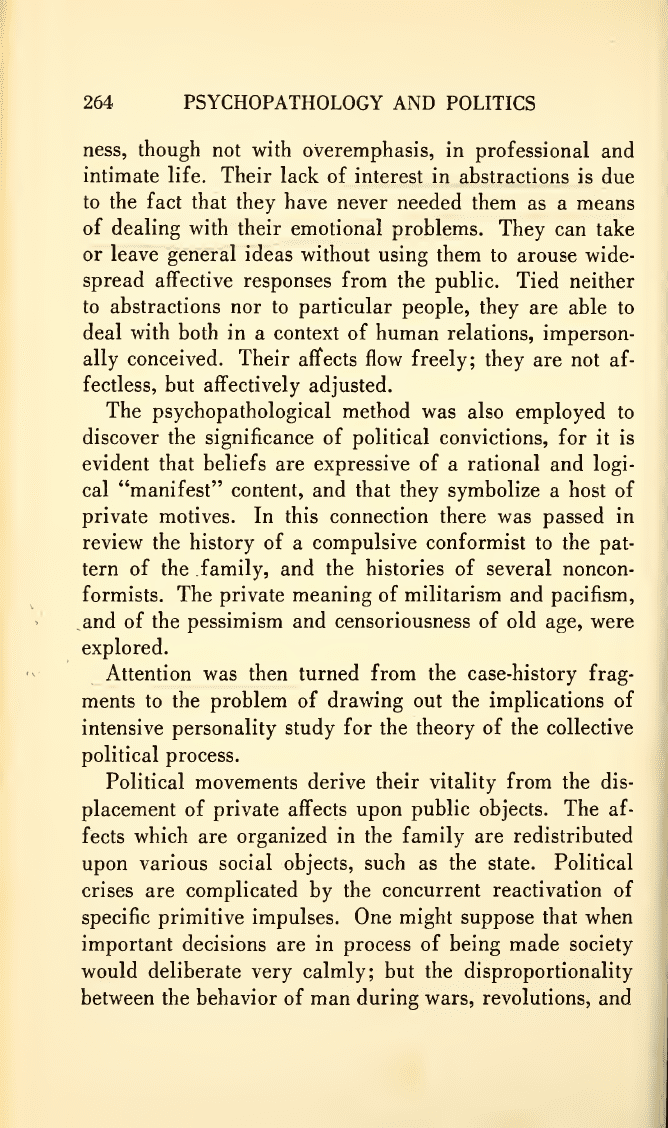
264
PSYCHOPATHOLOGY
AND
POLITICS
ness, though
not with overemphasis,
in professional
and
intimate life. Their
lack of
interest in
abstractions is
due
to the fact that they
have never
needed them
as
a
means
of dealing with
their emotional
problems.
They
can take
or leave general ideas
without using them
to arouse wide-
spread affective
responses from
the public.
Tied neither
to
abstractions
nor to particular people,
they
are able to
deal with both in
a
context of human
relations, imperson-
ally conceived. Their
affects flow freely;
they
are not af-
fectless,
but
affectively
adjusted.
The psychopathological
method was also
employed
to
discover the significance of political
convictions, for
it is
evident that beliefs
are
expressive of
a
rational and logi-
cal "manifest" content, and that they symbolize
a
host of
private motives. In
this
connection there was
passed
in
review
the history of
a
compulsive conformist
to
the
pat-
tern
of the family,
and
the histories of
several noncon-
formists. The private meaning of militarism
and
pacifism,
and of the
pessimism and censoriousness of
old age, were
explored.
Attention was then turned from the case-history
frag-
ments to
the problem of drawing out the implications of
intensive personality study
for the theory of the collective
political
process.
Political
movements derive their vitality
from
the dis-
placement of private
affects
upon
public
objects. The af-
fects
which are
organized in the family are redistributed
upon
various
social objects, such
as
the state. Political
crises
are
complicated
by
the
concurrent reactivation of
specific primitive impulses. One
might
suppose that when
important
decisions are in process
of being made society
would
deliberate
very calmly; but
the disproportionality
between the behavior of
man
during wars, revolutions,
and
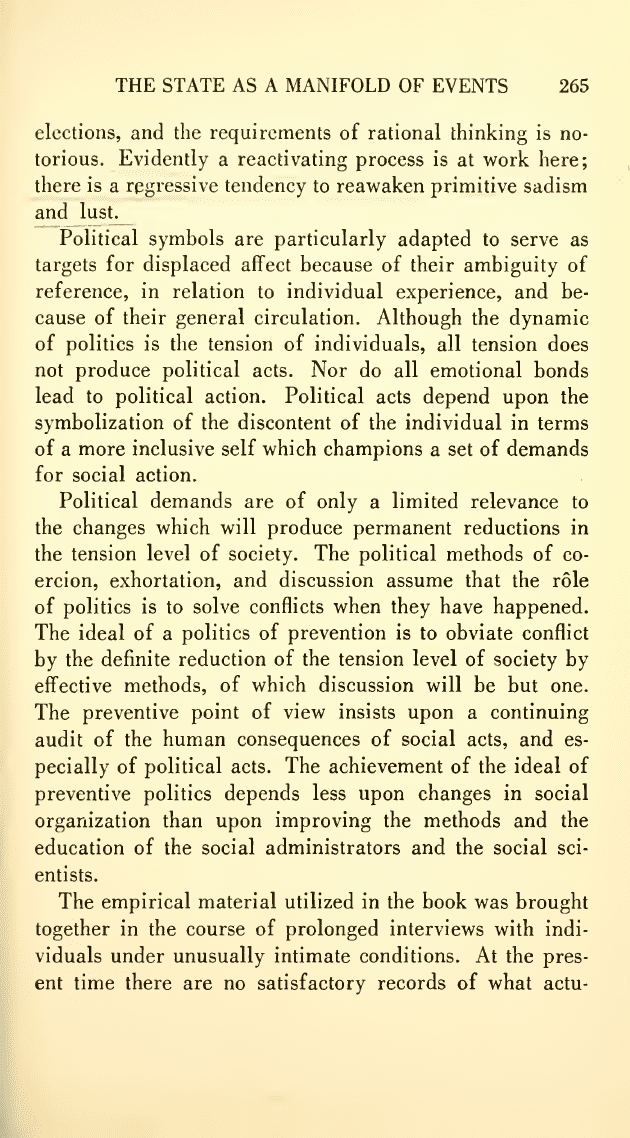
THE
STATE AS
A
MANIFOLD
OF
EVENTS 265
elections, and the requirements
of rational thinking
is no-
torious. Evidently
a
reactivating process is
at work here;
there
is
a
regressive tendency
to reawaken primitive
sadism
and
lust.
Political symbols
are particularly
adapted to serve as
targets
for displaced
affect
because
of their ambiguity
of
reference, in
relation
to
individual
experience,
and be-
cause of their general circulation.
Although the dynamic
of politics is the
tension of individuals,
all tension
does
not produce political
acts. Nor do all emotional
bonds
lead to political action. Political
acts depend
upon the
symbolization of the discontent of the
individual in terms
of
a
more inclusive self which champions
a
set of demands
for social
action.
Political demands
are of only
a
limited
relevance to
the
changes
which will
produce permanent
reductions in
the
tension level of society. The
political methods of
co-
ercion, exhortation,
and discussion
assume that the role
of politics is
to
solve
conflicts when
they have happened.
The ideal of
a
politics of
prevention is
to obviate conflict
by
the
definite reduction
of the tension
level of society
by
effective
methods,
of which discussion will
be but one.
The
preventive
point of view
insists
upon
a
continuing
audit
of the
human consequences of social acts,
and es-
pecially of
political
acts.
The achievement of the ideal
of
preventive politics depends
less upon changes
in
social
organization than upon
improving the
methods and the
education
of the social administrators and the social sci-
entists.
The
empirical material utilized in the
book was brought
together
in
the course of prolonged interviews
with indi-
viduals under
unusually
intimate
conditions.
At
the pres-
ent time there
are no satisfactory
records of
what actu-
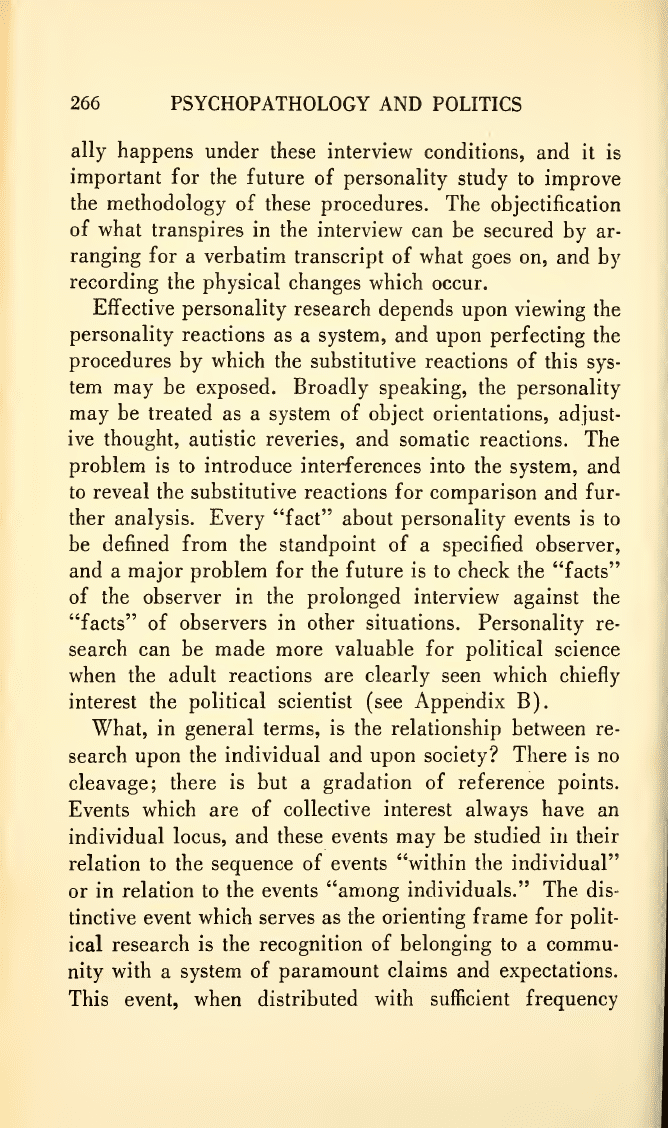
266
PSYCHOPATHOLOGY
AND
POLITICS
ally
happens under
these interview
conditions,
and
it is
important
for the future
of personality
study
to improve
the
methodology
of
these procedures. The
objectification
of
what transpires
in
the
interview
can be secured
by ar-
ranging
for
a verbatim transcript
of what
goes on, and
by
recording
the physical
changes which
occur.
Effective
personality
research depends
upon viewing
the
personality
reactions
as
a
system,
and upon perfecting
the
procedures by which
the substitutive
reactions of this
sys-
tem
may be exposed.
Broadly speaking,
the personality
may be treated
as a system of object orientations,
adjust-
ive thought,
autistic reveries, and somatic
reactions.
The
problem
is to introduce interferences
into the system,
and
to reveal the
substitutive
reactions for comparison
and
fur-
ther analysis. Every
"fact" about personality
events is to
be
defined from the standpoint
of
a
specified
observer,
and a
major problem for the future is
to check the "facts"
of the observer in the prolonged interview
against the
"facts" of
observers in other situations.
Personality
re-
search
can be
made more valuable for political
science
when
the adult reactions are clearly seen which chiefly
interest the
political scientist
(see
Appendix
B).
What,
in
general terms, is the relationship
between re-
search
upon
the individual and upon society? There is no
cleavage;
there is
but a
gradation of reference points.
Events
which are of
collective interest always have
an
individual
locus, and
these events may be studied in their
relation
to
the
sequence of events
"within the
individual"
or
in relation
to
the events
"among individuals."
The
dis-
tinctive event
which serves as
the orienting frame for
polit-
ical
research is the
recognition of
belonging
to
a
commu-
nity
with
a
system
of paramount
claims
and expectations.
This event, when distributed
with sufficient frequency
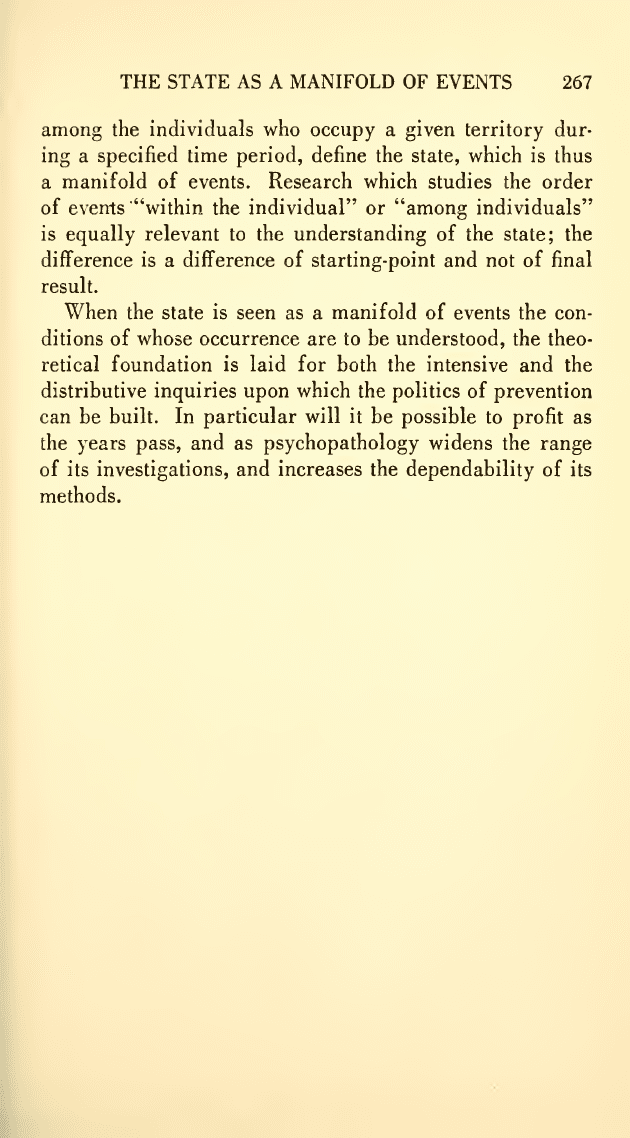
THE
STATE
AS A
MANIFOLD
OF
EVENTS 267
among
the individuals who occupy
a
given territory
dur-
ing
a
specified time period, define the
state,
which
is thus
a
manifold of events. Research which studies
the order
of events
"within
the
individual"
or "among individuals"
is equally relevant to
the understanding
of the state; the
difference is
a
difference of starting-point
and not of final
result.
When the
state
is
seen as a
manifold
of events
the con-
ditions of whose
occurrence
are to
be
understood,
the theo-
retical foundation is laid for both the
intensive
and
the
distributive inquiries upon
which
the politics of
prevention
can
be
built.
In
particular will it
be possible
to profit as
the years pass, and as
psychopathology
widens the
range
of its investigations, and
increases the
dependability of
its
methods.
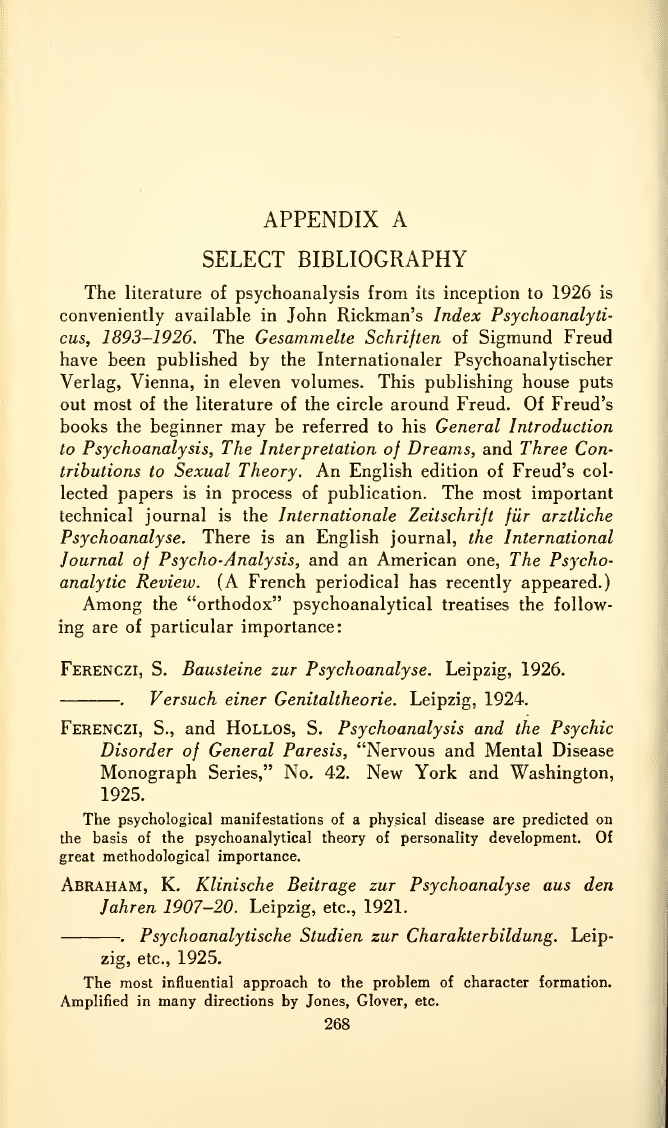
APPENDIX
A
SELECT BIBLIOGRAPHY
The literature of psychoanalysis from its inception to
1926 is
conveniently
available in
John
Rickman's Index
Psychoanalyti-
cus,
1893—1926.
The
Gesammelte
Schriften
of
Sigmund Freud
have been published
by
the Internationaler Psychoanalytischer
Verlag, Vienna, in eleven volumes. This publishing house puts
out most of
the literature
of the circle around Freud. Of Freud's
books the beginner may
be referred to his
General Introduction
to
Psychoanalysis,
The Interpretation
of
Dreams,
and
Three
Con-
tributions
to
Sexual Theory. An English edition
of
Freud's col-
lected papers
is in process
of
publication.
The most important
technical journal is the
Internationale
Zeitschrijt
fiir
arztliche
Psychoanalyse. There is an English journal,
the International
Journal
of
Psycho
-Analysis,
and an American
one, The Psycho-
analytic
Review. (A French periodical
has recently
appeared.)
Among the "orthodox" psychoanalytical
treatises the
follow-
ing are
of particular
importance:
Ferenczi,
S.
Bausteine
zur
Psychoanalyse. Leipzig,
1926.
.
Versuch einer
Genitaltheorie. Leipzig, 1924.
Ferenczi,
S.,
and Hollos,
S.
Psychoanalysis
and
the
Psychic
Disorder
of
General
Paresis,
"Nervous and Mental Disease
Monograph
Series,"
No. 42.
New York and Washington,
1925.
The
psychological manifestations of
a
physical disease
are
predicted on
the
basis of the
psychoanalytical theory
of
personality
development.
Of
great
methodological importance.
Abraham,
K.
Klinische Beitrage zur Psychoanalyse aus den
Jahren
1907-20.
Leipzig,
etc., 1921.
.
Psychoanalytische Studien
zur
Charakterbildung. Leip-
zig, etc.,
1925.
The
most
influential approach to the problem of
character
formation.
Amplified in many directions
by
Jones,
Glover, etc.
268
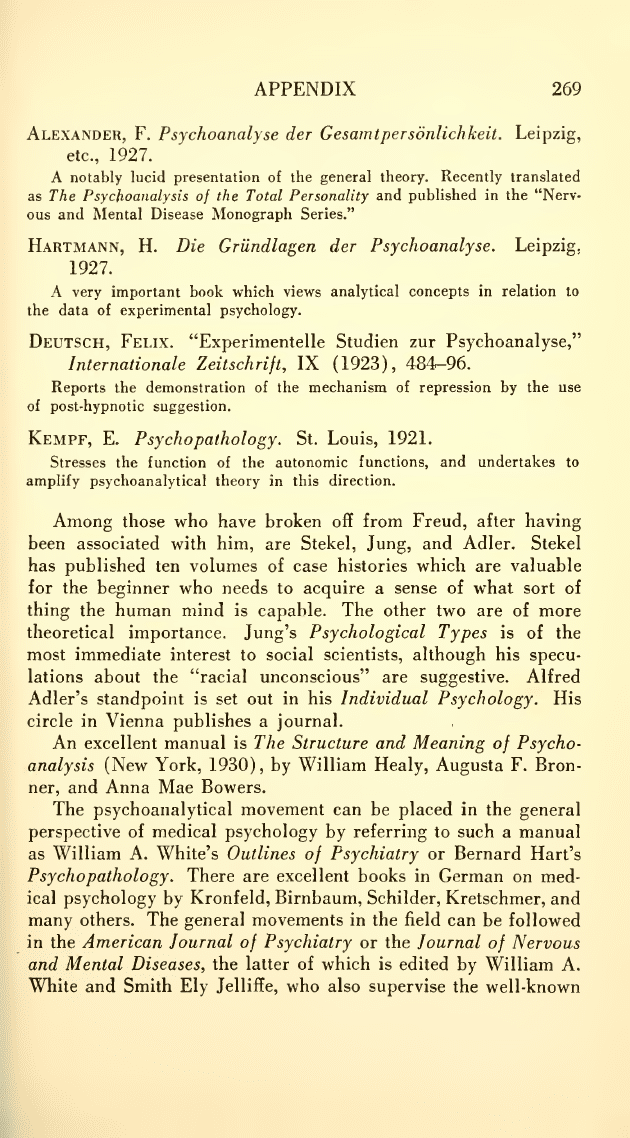
APPENDIX
269
Alexander,
F. Psychoanalyse der
Gesamtpersonlichkeit. Leipzig,
etc., 1927.
A notably
lucid presentation of the
general theory. Recently translated
as The Psychoanalysis
of
the Total Personality
and
published
in the
"Nerv-
ous
and Mental Disease Monograph
Series."
Hartmann,
H.
Die Griindlagen der
Psychoanalyse.
Leipzig,
1927.
A very
important book
which
views
analytical concepts in
relation
to
the data of
experimental psychology.
Deutsch, Felix. "Experimentelle
Studien zur
Psychoanalyse,"
Internationale Zeitschrift,
IX
(1923),
484-96.
Reports
the
demonstration of the
mechanism
of
repression
by
the use
of post-hypnotic suggestion.
Kempf,
E.
Psychopathology. St. Louis,
1921.
Stresses the function
of
the
autonomic
functions, and
undertakes to
amplify psychoanalytical theory in this
direction.
Among those who
have
broken off from Freud,
after having
been associated with him,
are
Stekel,
Jung,
and Adler.
Stekel
has published
ten volumes of case
histories which are valuable
for the
beginner who needs to acquire
a
sense of what sort of
thing
the human mind is capable. The other
two are of more
theoretical
importance.
Jung's
Psychological
Types is of the
most immediate interest
to
social scientists, although his
specu-
lations
about the "racial
unconscious"
are
suggestive.
Alfred
Adler's
standpoint is set out
in his Individual Psychology.
His
circle in
Vienna
publishes
a
journal.
An excellent manual is The Structure and Meaning
of
Psycho-
analysis (New York,
1930),
by
William
Healy, Augusta F. Bron-
ner, and
Anna Mae
Bowers.
The psychoanalytical movement can be placed in the
general
perspective of medical psychology
by
referring
to
such
a
manual
as
William
A.
White's Outlines
of
Psychiatry
or Bernard
Hart's
Psychopathology. There
are
excellent books in
German
on med-
ical psychology
by
Kronfeld, Birnbaum, Schilder,
Kretschmer,
and
many
others. The
general movements in the field
can
be followed
in the
American
Journal
of
Psychiatry
or the
Journal
of
Nervous
and
Mental Diseases, the latter of which is edited
by
William
A.
White and Smith Ely Jelliffe, who also supervise
the
well-known
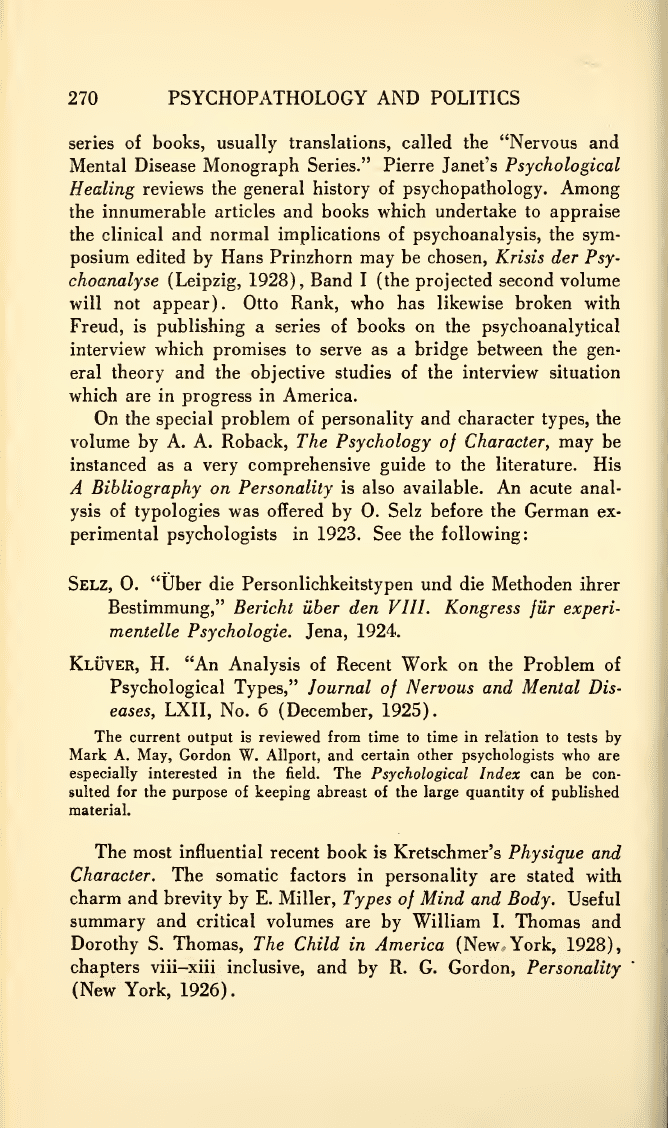
270 PSYCHOPATHOLOGY AND POLITICS
series of
books, usually translations, called the "Nervous and
Mental
Disease Monograph Series."
Pierre
Janet's
Psychological
Healing
reviews the general
history of psychopathology. Among
the
innumerable
articles
and
books which undertake to appraise
the clinical
and normal implications of psychoanalysis, the sym-
posium
edited by Hans Prinzhorn may be chosen, Krisis der
Psy-
choanalyse (Leipzig,
1928),
Band I (the projected second volume
will not appear). Otto
Rank,
who has
likewise broken
with
Freud, is
publishing
a
series
of
books
on
the psychoanalytical
interview
which promises
to serve as a
bridge between the gen-
eral
theory
and the objective studies of the
interview situation
which are in
progress
in America.
On the special problem of personality and character types,
the
volume
by A.
A. Roback, The Psychology
of
Character, may be
instanced
as a very
comprehensive guide
to
the literature. His
A
Bibliography
on
Personality is also available. An
acute anal-
ysis of
typologies
was
offered
by 0. Selz before
the
German ex-
perimental psychologists
in 1923.
See
the following:
Selz, 0. "Uber
die Personlichkeitstypen
und
die
Methoden
ihrer
Bestimmung,"
Bericht iiber den VIII. Kongress
fiir
expert-
mentelle
Psychologic.
Jena,
1924.
Kluver,
H. "An Analysis
of
Recent Work
on the Problem of
Psychological
Types,"
Journal
of
Nervous and Mental Dis-
eases,
LXII,
No.
6
(December,
1925).
The current output is reviewed from time
to
time in relation
to tests by
Mark A. May, Gordon
W. Allport, and
certain other psychologists
who are
especially
interested in the field. The
Psychological Index can be con-
sulted for the purpose
of
keeping
abreast of
the large quantity
of published
material.
The most influential
recent book is
Kretschmer's Physique
and
Character. The somatic
factors in personality
are stated
with
charm and brevity
by E. Miller, Types
of
Mind and Body.
Useful
summary and
critical volumes
are
by
William I. Thomas
and
Dorothy
S.
Thomas,
The Child
in America (New York,
1928),
chapters viii-xiii
inclusive, and
by
R. G.
Gordon,
Personality
(New
York,
1926).
